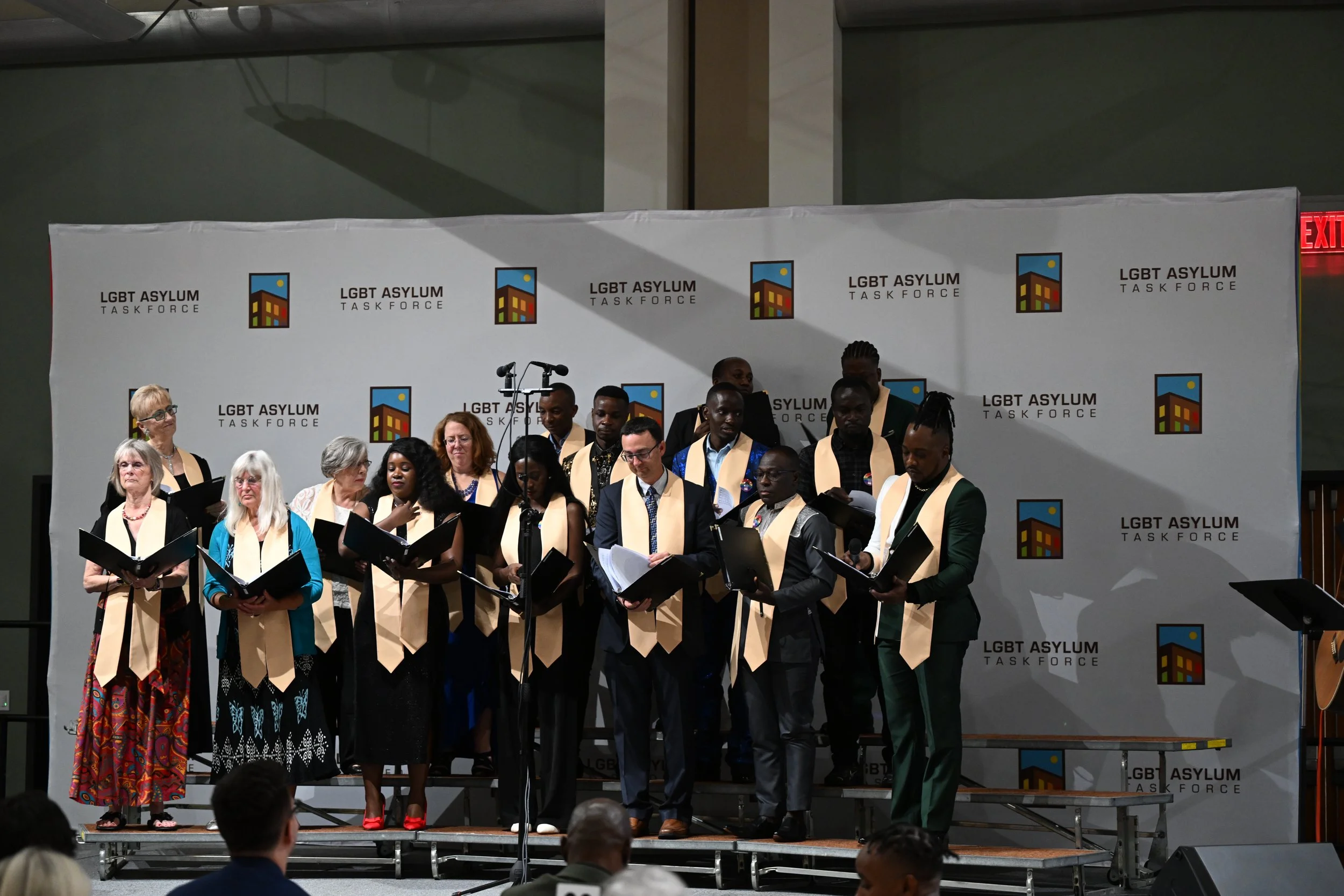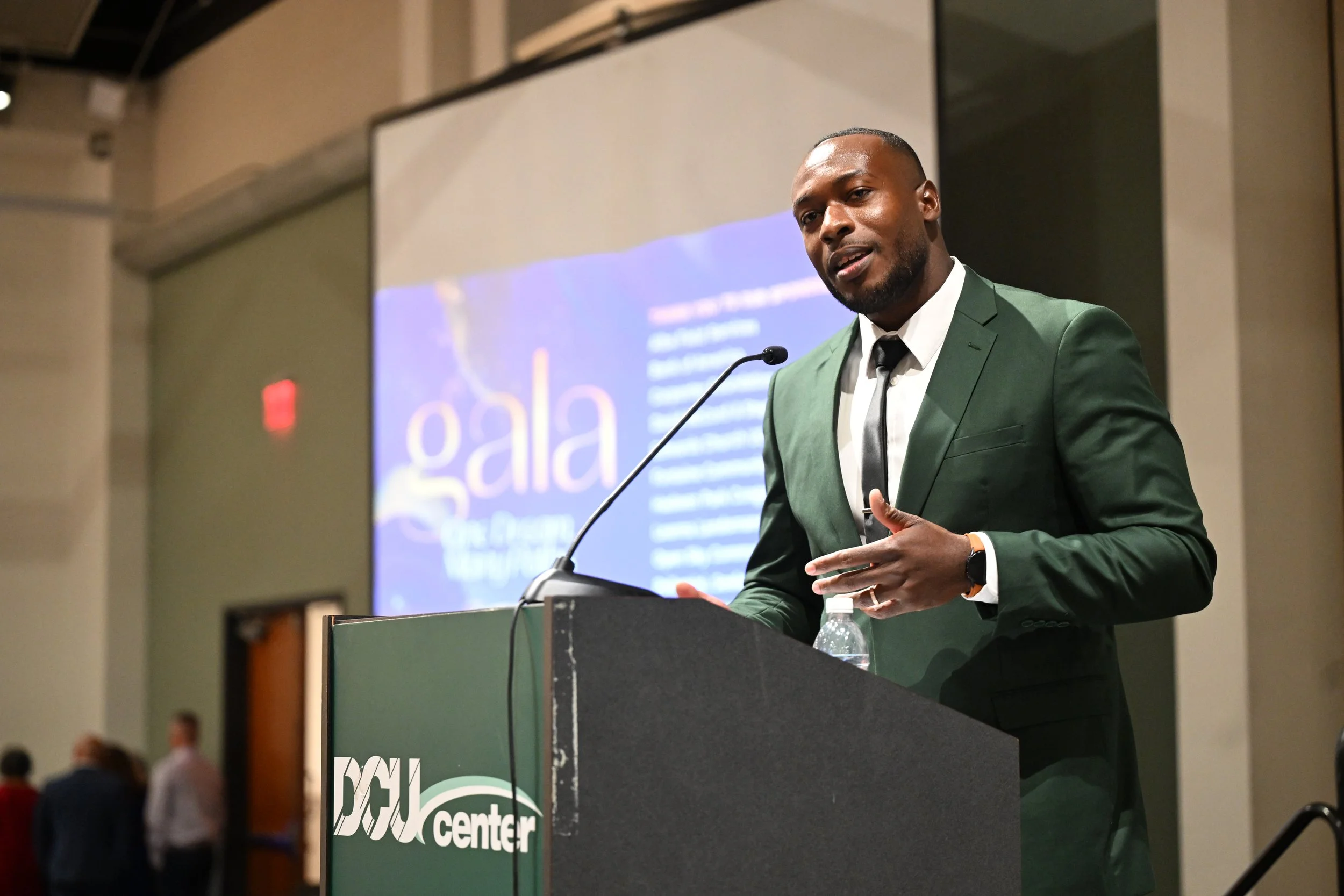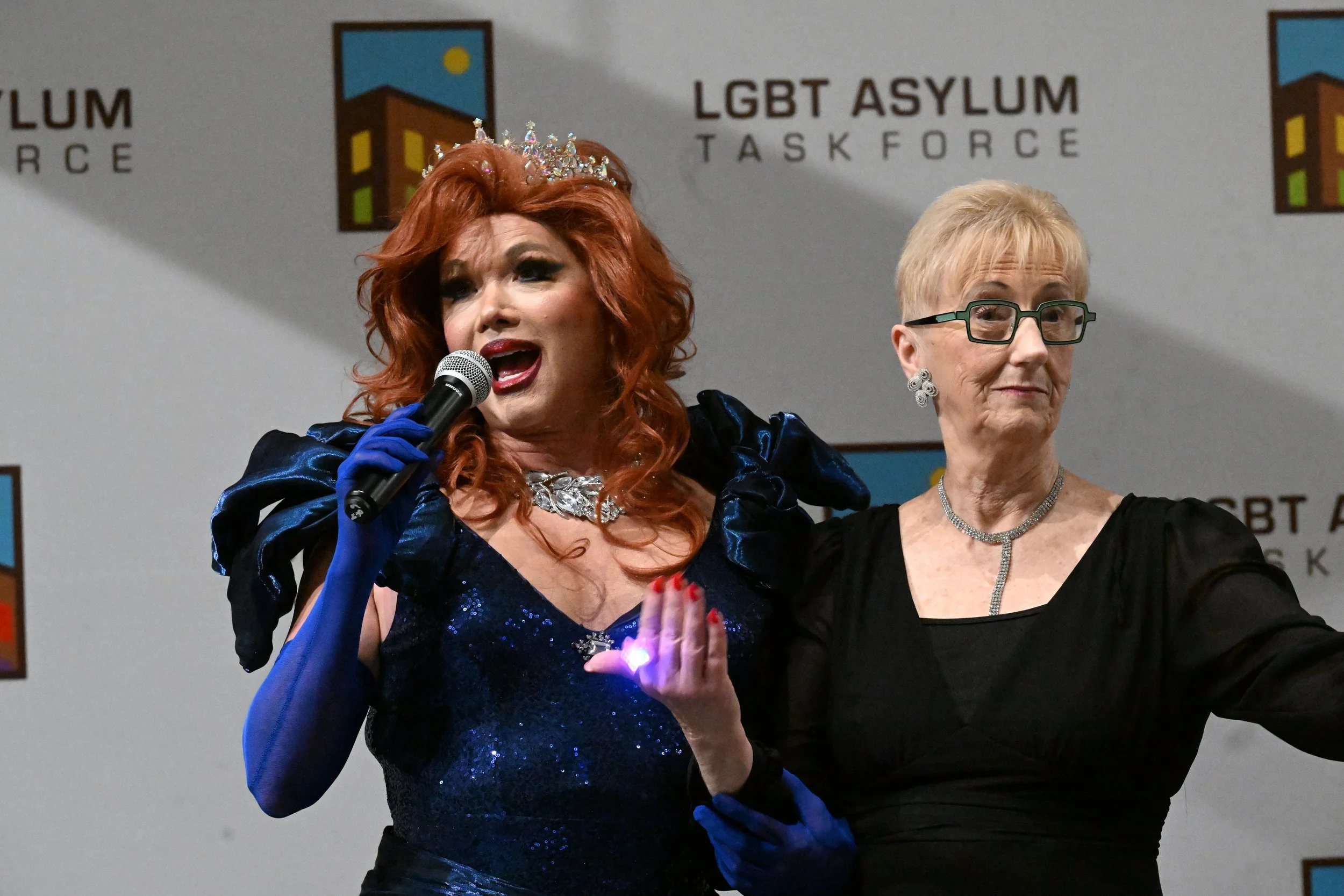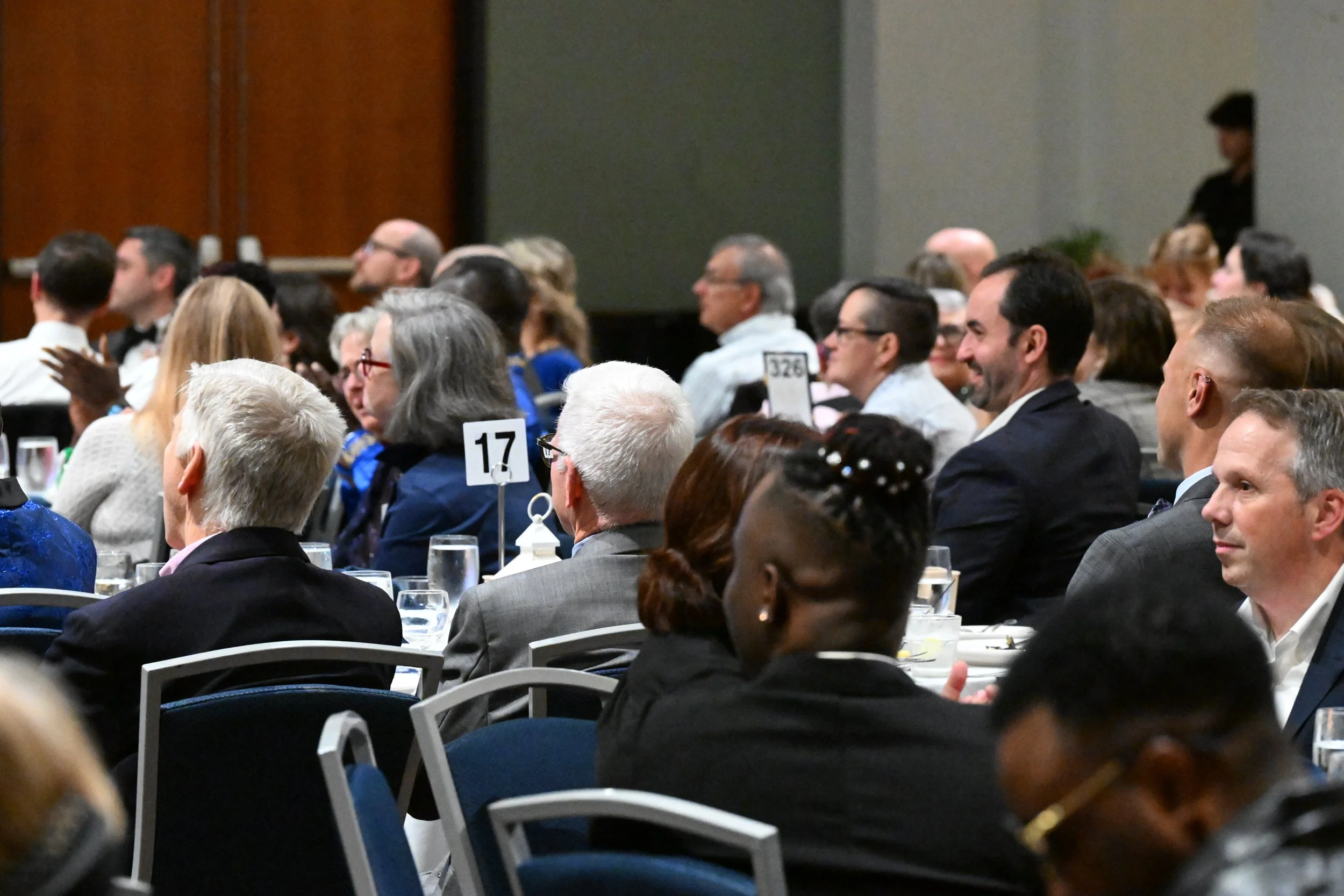Stand Up Now: Inside the Life-Saving Work of Worcester’s LGBT Asylum Task Force
{ Jenny Pacillo }
THE STORY OF THE LGBT Asylum Task Force begins in 2004, four years before the task force was even created, at the Hadwen Park Congregational Church, UCC in Worcester. “If I were to backtrack, our church in 2004 voted to be open and affirming,” Ministry Director of the LGBT Asylum Task Force Al Green begins, “which is the designation that our denomination, United Church of Christ, is accepting and welcoming of LGBTQ people. It also happened to be around the same time as the Equal Marriage fight in Massachusetts. And our pastor, Pastor Judy Hanlon, got involved within that movement. She spoke at the State House and was written up in the newspapers, and so there was some publicity around our church and her being involved in that.”
Four years later, a gay asylum seeker from Jamaica arrived in Worcester, scared and alone. He had fled violence and persecution, and while his legal representation could help him navigate the asylum application, they knew he needed more than a lawyer. “He was in need of just basic support, so housing and food, but he also had serious doubts as to whether God loved him as a gay man,” Green says. His attorney remembered an article from four years earlier about a small church in Worcester that had made headlines during Massachusetts’s equal marriage debate. “The lawyer recognized that she could help with some of it, but she thought, there’s this affirming church here in Worcester that could stand with him,” says Green, adding, “He made the connection, and our church did what so many churches do or should do, and just opened the door and welcomed him, provided support, and learned about the asylum process as well, because we had no idea what it entailed.”
Hadwen Park Congregational Church supported the asylum seeker as they navigated the work permit process and well after. Word quickly spread and without meaning to, the congregation had launched what would become one of the only ministries of its kind in the country. “Having received such a warm welcome and support, he told his friends who also were going through similar situations about the church, and that’s how we got to being founded in 2008. Since then, we’ve directly housed and supported over 400 asylum seekers from almost 40 different countries,” Green explains.
From their modest beginnings, the LGBT Asylum Task Force and Hadwen Park Congregation Church have grown into a national model of holistic, life saving care for LGBTQIA+ asylum seekers. “It really is a remarkable origin story. Instead of wanting to do any of this or thinking that all of what we’ve accomplished would have been possible,” says Green, “it was just opening the door and welcoming a stranger, as we believe our religion calls us to do and learning along the way, and it’s just blossomed into this ministry.”
Green found the Task Force in 2016 and quickly fell in love with it. At the time he was living in Worcester and struggling to stay afloat when his lawyers referred him to the Task Force. “I’m a seeker myself,” he shares, ”They said, ‘Hey, there’s this church with a ministry all set up to provide housing and financial support.’” He got connected to Hadwen Park Church, became immersed in the community, and soon began volunteering on several committees, one of which was searching for a new director.
After an exhaustive six-month search narrowed the candidates to two finalists, both of whom took jobs elsewhere, Pastor Judy asked Green if he would consider stepping in. “She said, ‘You’re already doing some of the work. Would you consider it?’” Green remembers, “My background is in civil engineering. That’s what I went to school for, what I did before seeking asylum. It was very different and I asked for couple of weeks to consider it. So I did, and then I said, ‘Okay I’ll do it for a six month period, just to try it out, and then also to give you guys some time to find someone else.’”
This September marks Green’s eighth year in the role.
The work of the LGBT Asylum Task Force is equal parts urgent and overwhelming. Every year, around 150 people reach out for help, but the organization only has space for about a third of them. The rest are referred to other programs, some of which Green and his team have helped mentor into existence across the U.S. “Folks reach out to us all the time, different churches and different states, different individuals, groups that want to do this work,” says Green, “We’re basically the model. Honestly why we’ve chosen to go this route, which is very expensive to provide housing and to do all of the wraparound services that we connect people to, is that we know the importance of having community, of having access to resources and influencing the outcome of their asylum cases.”
Assistant Ministry Director Andrew Bishop joined the Task Force a year and a half ago, when he moved to Worcester with his partner. “I started looking for jobs in the area, and this was actually the first job I applied to. I told everybody it was my dream job, it was the job I really wanted,” Bishop recalls, “Thankfully, they called me back for an interview, and we all really liked each other, and they offered me the job, and I’ve just been super, super happy with it, and very grateful that they chose me to carry the torch.”
Green and Bishop are the only full time employees at the Task Force, and their job description is a little bit of everything from navigating the federal landscape to maintaining their two properties. They provide housing, food, and connections to legal, educational, medical, and mental health resources at other local agencies. “We wear many hats. Some days we’re caseworkers and sitting down with individual asylum seekers,” Bishop explains, “And I can’t tell you how many times I’ve taken folks to the hospital for whatever care they need, getting them signed up for health insurance, taking them to the bank, setting up a bank account, and just following along with their asylum process and making sure everything’s running smoothly for them. Then on top of it, we’re constantly trying to fundraise.”
Green adds, “We connect people to career training resources. We connect them to mentors at different companies. We try to set up training opportunities as well. Get them set up ahead of time while they’re waiting for their work permits, so that once they receive that, they’re able to have the tools to make it a little bit easier for them to find a job, although that in of itself, is a difficult process.”
Despite Bishop and Green’s busy schedules, they make it a priority to respond to every single asylum seeker who reaches out to the Task Force. “I remember when I first started, something I was really proud of is no matter who reaches out to us, if they are looking for support, even if we can’t help them, we do at least make sure we respond to everyone and try to send them to some organization that might actually be able to support them. So no email goes unanswered with us,” says Bishop.
Unlike a traditional shelter, the Task Force offers guaranteed housing, financial support, and holistic care until an individual receives a work permit and can support themselves. “We’ll take care of those basic needs so you can focus on this process, and we’ll connect you to the tools so that when you are able to work you’re on a much better footing than you would have ordinarily been on by yourself. It’s something that we’ve committed to doing,” says Green.
From there, they’re given a three-month transition period to find a job, save for rent, and get established. But it absolutely takes a village, and community is a huge part of the Task Force’s model. “Over the years, we’ve built partnerships with different agencies and are able to direct asylum seekers based on their individual needs to various resources,” Green begins, “the majority (of asylum seekers) do speak English, but for those who don’t, we take them to the Worcester Public Library to get registered in the ESL courses there. There’s Family Health Center, there’s AIDS Project Worcester as well. We work a little bit with EMK (Edward M. Kennedy Community Health Center) as well, for those who are going through the transitioning process. We’ve built these local partnerships over the years. We take folks to get registered for a bank account at Berkshire Bank. They have the fewest barriers and actually, they’re the only bank that we’ve found locally where our folks are eligible to get bank accounts. We try to break down the various barriers. We partner with QCC, and Mass Hire to waive some of the requirements to access their resources as well.”
“Really, the two services that we offer are the housing and the living stipend. Everything else has come from other community organizations that we’re just fortunate enough to have around and to be able to link to,” Bishop explains, “of course like Mass Health. Folks would not be able to seek health care if it wasn’t for the Health Safety Net program. There’s also so many job readiness organizations like Mass Hire, there’s an organization called Tent that does mentoring for specifically LGBT refugee people. They pair asylum seekers up with a LGBT person in the corporate space, to help get them ready for whatever field they might want to go into. And just dozens more.”
Many of the asylum seekers at the Task Force come from Jamaica and Uganda, countries where LGBTQ identities are criminalized and targeted by violence. But over the years, residents have come from almost 40 countries across Africa, the Caribbean, the Middle East, and Latin America.
People find the Task Force through all kinds of pathways: Google searches, referrals from lawyers or caseworkers, word of mouth. Some are already in the U.S. when they reach out; others are still in their home countries. “Folks get to us through a whole range of means. Some will look online for help, for LGBTQ people, for asylum seekers, and they’ll find us and reach out to us for help,” says Green, “Some will do that while they’re in their home country while some are already in the US.” For those outside the U.S., the Task Force partners with Rainbow Railroad, a Canada-based organization that specializes in extraction and relocation. “We’re not set up to get people out,” Green clarifies. “We’re set up to receive them and help them through the asylum process.”
The Task Force can even help asylum seekers who are already in the United States but can’t afford to make their way to Worcester. “We will help get a plane ticket or bus ticket, depending on where they’re located, just to facilitate them getting to us,” says Green, “If they’re not interested in relocating, because some have set up roots in certain states or certain cities, we will try to connect them to shelters or to other agencies that are doing work in the area that they’re located.”
“There are very few times where we have beds available and no one on our wait list. Each year we receive about 150 requests for housing. Typically, we’re able to house about 50 people here. So you have about 100 people who reach out to us that we can’t directly house, but we’ll try to direct them to other resources, some of which are ones that we’ve mentored and helped to get started in different states,” says Green.
The Task Force currently operates out of two triple-deckers in Worcester. Their housing model has evolved from members of the congregation hosting individuals in their homes, to renting apartments and to now owning their own properties. Owning the buildings allowed the Task Force to consolidate, creating a more supportive and efficient environment. “At one point we had folks in nine different locations across the city,” Green recalls, “It wasn’t ideal for providing services or helping people connect with each other.”
The federal asylum process has grown far more complicated in recent years, creating serious challenges for LGBTQ asylum seekers. “I think the biggest thing that I’m seeing is there’s just so much fear around everything, and I think that that was the whole point,” Bishop says, “Folks have that right to seek asylum in the United States, no matter what the administration is going to do, but everything that they have been doing has been really geared towards making people afraid. And it works. Unfortunately, it works for a lot of our asylum seekers. Some of them tell us that they’re afraid to leave the house some days just because of the stories that they hear.”
Green described how policy changes have added more steps, more uncertainty, and more pressure to an already difficult journey. “The Big Beautiful Bill that was just passed, within that it wasn’t necessarily publicized as much because folks were more concerned with the health care cuts, but within it were additional barriers for asylum seekers,” Green explains, “There is now a $100 annual fee in order to keep their asylum cases open. If they don’t pay that fee, then their case will be closed. Each year, they have to make sure that they don’t miss the deadline and they submit that fee. And true to the chaos of this administration, they haven’t even figured out or announced a way in which they will collect those fees, but they’re effective immediately.”
Aside from the confusion, related costs for asylum seekers have multiplied, significantly increasing the financial strain under the current federal administration. Green explains, “They implemented, effective immediately, $100 fee for asylum so you’re talking about folks who typically don’t earn much in their home countries, relatively speaking, and would have, for the most part, sold all their possessions or borrowed or begged in order to afford the visa application fee and the airfare to get here. They also implemented a $250 technically refundable fee, a visa fee, that folks would have to ask for to be refunded after they’ve returned to their home countries. So there’s that additional visa fee that’s now on the books. The first work permit that an asylum seeker applies for used to be free because, of course, how are you going to pay for it if you’re not working right? Which would make sense, but now there’s a $550 fee. So folks have to find that before they can even be eligible to work.”
Aside from providing financial assistance, the Task Force makes sure their asylum seekers know they are safe, cared for and supported. They hold a community dinner on the second Monday of the month, host gender roundtable discussions and other social events.
Bishop shares, “Reassuring them that they do have a right to be in the United States legally as they go through this process, and they might need to hear that 100 times and from a bunch of different people. We have lawyers, we’ve had the Mayor, we’ve had police officers come in and all just help reassure them. It’s been a lot of just reminding them as long as they’re here seeking asylum, following the law, they are safe in Worcester and there are people around that care for them and want to make sure they have a safe and happy life here.”
Surprisingly, the Task Force does not receive any local, state or federal funding due to the amount of strings attached to the process. They are small but clearly mighty, and the reporting requirements are arduous for an organization of their size. “It’s been something that we’ve lamented over the years. But considering the current administration, we’re happy we don’t rely on that,” Green chuckles before returning to a serious tone, “Not to say that we haven’t had issues. Folks are cautious about the economy, and we’ve seen some of our donors either pause or cancel their donations because they’re unsure. Either they were laid off or they’re unsure of the future, so that’s something that we’ve been dealing with. We’ve been trying, as much as possible, to increase the number of fundraisers and try to go after even more grants this year than we would in a typical year. So financially that’s the situation for us.”
Bishop adds, “Another, just big concern, is that we want to be able to absorb those costs that they’re about to start facing. It’s estimated that that’s going to increase our annual cost by like, $20,000. So right there is a big increase in the money that we need to raise on an annual basis. That’s something that’s been heavy on our minds as we’re going through the year.”
The largest fundraising opportunity is the annual LGBT Asylum Task Force Gala at the DCU on September 27th, where roughly 20% of their annual budget is raised. The theme for 2025 is Stand Up Now, and there is no doubt this will be a joyful night filled with fashion, music and fun. This year’s gala will feature entertainment by DanceAway Sound Productions and the All Nations Chorale, along with other surprises that are yet to be publicly announced and promise to be amazing.
The Gala is more than a fundraiser. It’s a celebration of courage, resilience, and community. It’s a night where the community comes together not just to give, but to witness the incredible journeys of asylum seekers who have built new lives here. Each story shared, each success celebrated, is a reminder of what’s possible when compassion meets action.
“It means a lot. It’s a reunion of sorts for the asylum seekers, or (residents) in our housing, as well as the folks who’ve transferred out of housing over the years, so they all come back. It’s a way for folks to just for one night, get all glammed up to have a good time and just be themselves,” Green smiles, “It is also a very good way for us to get the corporate world, to get businesses to become aware of the work that we’re doing, and then also see that impact through the stories that are told at the gala.”
For many attendees, the Gala is their first brush with the life-changing work of the LGBT Asylum Task Force. It’s an evening of celebration and storytelling, where the mission is brought to life through the voices and faces of those directly impacted. “There are folks whose first introduction to us is the Gala, because they are guests of someone who bought a table. And so they get to see folks and meet folks who are being supported, and hear those stories and see the impact. We usually see a spike in the donations, as well as the number of people who sign up to volunteer during the first few weeks after the Gala,” Green explains. For the organization, this visibility isn’t just about the evening itself, it’s the start of a deeper relationship with new supporters.
That spirit of involvement is something Green hopes will ripple well beyond the event’s closing moments. The Gala may last a few hours, but the work continues every day. “I just encourage folks, even if they’re not able to come to the Gala itself, they can make a donation towards the gala effort through our website. Just to get involved, whether it be with us or with some other entity that’s doing great work locally, because there are so many agencies that are doing amazing work. But just to get involved, not to be on the sidelines, there’s stuff that folks can do where they have a little bit of time. There are ways in which they can help to push back against all of the hate that’s out of Washington.” His message is clear: every action, big or small, matters.
The results of this collective effort are evident in the lives the Task Force has helped transform. Green sees that change up close every single day. “I’m able to see the direct impact on people’s lives,” he says, “There are folks who got to us as minors or as young adults and literally with nothing on their backs. And were able to go to school, get their degrees, graduate, get nice jobs. It’s just heartwarming to see that whole process and seeing the struggles that people face.” Those successes are the product of safety, stability, and a supportive community that gives asylum seekers the chance to thrive.
Bishop, who has worked alongside residents as they transition into their new lives, has witnessed that same transformation firsthand. “I’m at the point where I’m seeing a lot of folks that were in our housing when I first started, and were just getting their feet on the ground. Now I get to watch them receive their working papers, start their jobs, move out into their own apartments, and it is just night and day with so many of their faces like they start with us and they’re scared. They’re just so turned around and don’t really know what to do next. And then I blink, and all of a sudden they’re moving out, and they’re so excited, they have a job that they like, they’re happy and healthy and just ready to take that next step,” he smiles. These moments of watching someone go from fear to stability, are the milestones that define the Task Force’s work.
And the connection doesn’t end when someone moves on. Many residents remain part of the Task Force’s extended family, checking in and sharing life updates. “The majority stay in Central Mass or in Mass, just in general. But some go where it’s a lot warmer. Folks will send an email saying, ‘Hey, I’m in town, or a XYZ happened. I had my interview, and I won my case, or just graduated from university’, and they’ll send us pictures that’s always nice to see. Like I mentioned earlier, just seeing folks go through all this anxiety and the fear when they initially get here, to relaxing a bit and saying, ‘Okay, I’m in a safe place and I am focused on my goals and the next steps that I’m going to take’, and then to see them check those goals off. It is very heartwarming to observe,” Green says. The bonds formed at the Task Force are rooted in shared trust, care, and resilience.
The Gala may shine for a single night each year, but the need for the LGBT Asylum Task Force is ongoing and urgent. Every day, the organization is providing not just housing and legal aid, but holistic care, food, counseling, community, and the stability that allows people to rebuild their lives in safety. In a climate where asylum seekers face mounting challenges, the Task Force’s work is a testament to what unwavering commitment and compassion can achieve. It’s a reminder that safety is not just the absence of danger, but the presence of opportunity, dignity, and hope. And it’s a call to action for the community: to keep showing up, to keep standing alongside this work, and to help ensure that every person who arrives in Worcester seeking refuge can find not only safety, but a home.




